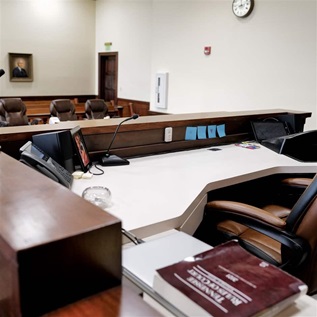When Courts Fall Short, Foster Children Pay the Price: New DVD Calls for Sweeping Changes
Too many children are spending more time than necessary in foster care, due in part to delays, limited information and poor communication in the nation's juvenile and family courts. A new DVD released by the nonpartisan, blue-ribbon Pew Commission on Children in Foster Care portrays the causes and consequences of court-based delays and explains how the Commission's recommendations can improve the ability of courts to move children quickly out of the legal limbo of foster care and into safe, permanent homes.
At the release of the DVD, Commission Chairman Bill Frenzel, a former member of Congress, welcomed news that Senators Mike DeWine (R-OH) and Jay Rockefeller (D-WV) are developing legislation informed by these recommendations. In a joint statement released today, Senators DeWine and Rockefeller said, "We share a strong commitment to promote bipartisan action on behalf of children in foster care, which is why we are working on legislation based on many of the Pew Commission court recommendations."
The Pew Commission's DVD, Fostering the Future, uses firsthand accounts from children, parents, judges, administrators and others to depict the high-stakes decisions courts make, as well as the obstacles – such as court delays, a lack of information, and the failure of all parties to collaborate in the decision-making process - that can prevent children from exiting foster care.
The DVD release comes one year after the Pew Commission released its final report recommending sweeping reform of the juvenile and family courts and of federal child welfare financing. Since then, many state courts across the county have embraced the Commission's court recommendations. In California, Utah, Michigan, Washington, Minnesota, New York, Pennsylvania, Indiana and Arizona, courts and child welfare agencies are shedding their traditionally adversarial positions to move children in their care to safe, permanent families.
The Commission's court recommendations would give courts the tools needed to improve their oversight of foster care cases; promote collaboration between the courts and child welfare agencies; and help every child and parent have an effective voice in the court proceedings that affect their lives. The Commission specifically calls on Chief Justices to give children's safety, permanence and well-being top priority in the state court system and on national policy makers to jump-start key court reforms.
"Courts are the 'silent partners' in child welfare, yet they are vested with enormous responsibility for making life-altering decisions for the children and families before them," stated Commission Chairman Bill Frenzel, a twenty-year veteran of Congress and former Ranking Minority Member of the House Budget Committee. "Our Commission was determined to give judges the tools and information they need to make wise and timely decisions and to give children and parents a strong and informed voice at every stage of the court process. Too much is at stake to do anything less."
"Too often, the family courts are near the bottom of the food chain," declared Michigan Supreme Court Justice and Pew Commission member Maura Corrigan. "They are the last in line when it comes to getting the tools, information and training they need to make good decisions. The Pew Commission identified specific, targeted court reforms. Without such change, the children who are at the center of the court's work will continue to be overlooked and underserved."
"You can't spend a day in court dealing with families without understanding the importance of giving children and parents a strong and informed voice," stated Utah Court of Appeals Judge and Pew Commission member William A. Thorne Jr. "The decisions judges make profoundly change a child's and family's life – for better or worse. We should not make those decisions without their considered input."
The Role of the Courts in Foster Care
Courts share responsibility with child welfare agencies to protect children from harm. Courts determine whether abuse or neglect has occurred and whether a child should be removed from the home. Federal law also charges courts with ensuring that children are moved from foster care and placed in a safe, permanent home within specific timeframes. This includes deciding if and when a parent's rights should be terminated, and whether a child should be adopted or placed with a permanent guardian.
The Commission's court recommendations, as detailed in Fostering the Future, call for:
- Adoption of court performance measures by every dependency court to ensure that they can track and analyze their caseloads, increase accountability for improved outcomes for children, and inform decisions about the allocation of court resources;
- Incentives and requirements for effective collaboration between courts and child welfare agencies on behalf of children in foster care;
- A strong voice for children and parents in court and effective representation by better trained attorneys and volunteer advocates;
- Leadership from Chief Justices and other state court leaders in organizing their court systems to better serve children, provide training for judges, and promote more effective standards for dependency courts, judges, and attorneys.
About the Pew Commission
The nonpartisan Pew Commission on Children in Foster Care was launched on May 7, 2003. Supported by grants from The Pew Charitable Trusts and The Annie E. Casey Foundation to the Georgetown University Public Policy Institute, the panel includes some of the nation's leading child welfare experts. The panel was charged with developing practical, evidence-based recommendations related to federal financing and court oversight of child welfare to improve outcomes for children in foster care, particularly to expedite the movement of children from foster care to safe, permanent families and to prevent unnecessary placements in foster care. The views expressed in the DVD and the companion guide are those of the Commission, and do not necessarily reflect the views of The Pew Charitable Trusts or The Annie E. Casey Foundation.
For additional information about the Pew Commission on Children in Foster Care, or to obtain a copy of the Commission's DVD and companion guide, please visit the Commission's Web site.






